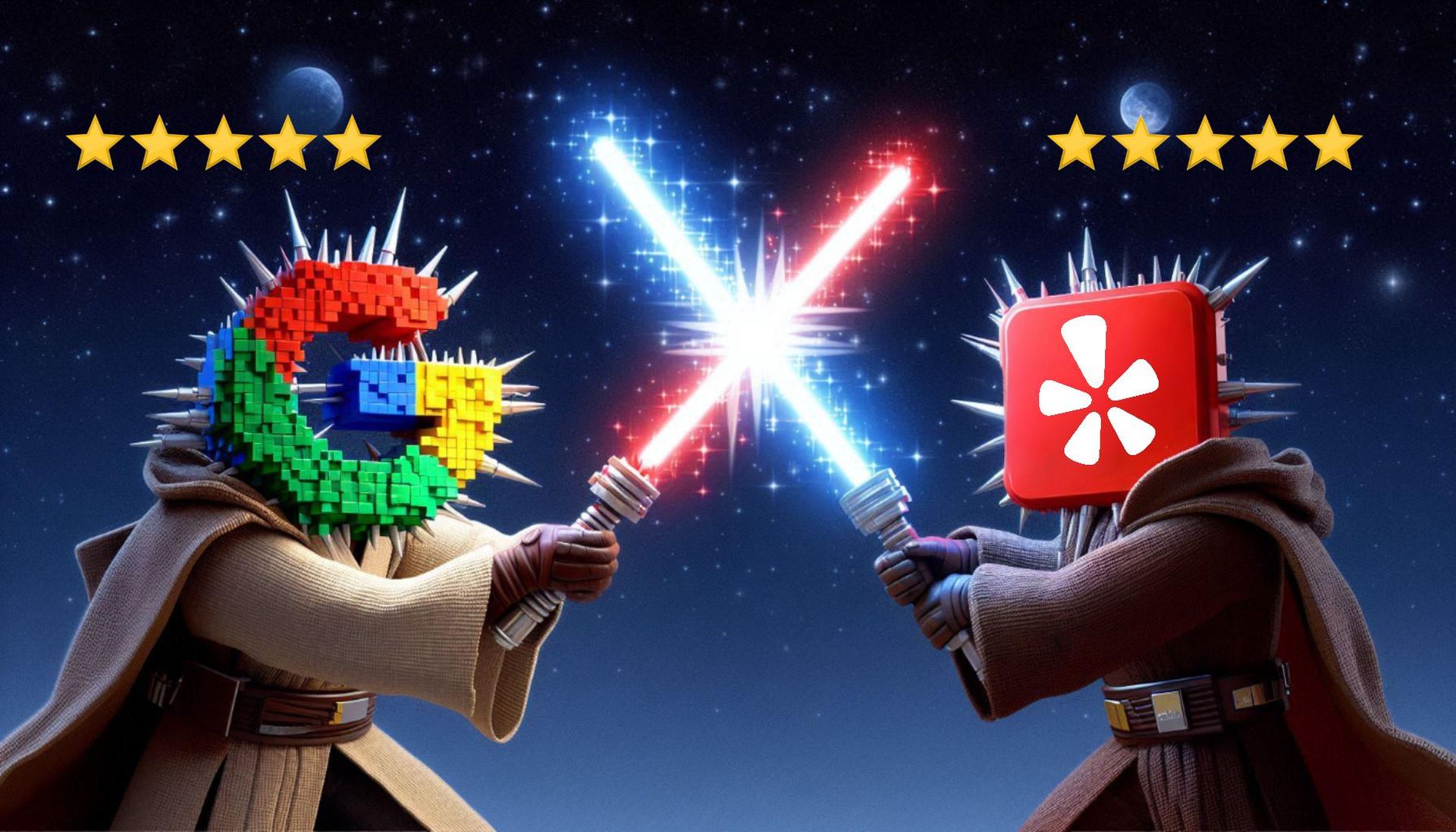and the distribution of digital products.
Google-Yelp lawsuit: A different kind of star wars

The battle between tech giants has heated up with the Google-Yelp lawsuit. Yelp, the popular review platform, is accusing Google of using its power as the top search engine to push its own services and shut out competitors. This isn’t just a fight between two companies—it’s a challenge to Google’s dominance that could change how we search for and find information online. Here’s what Yelp is claiming and why this case could have a big impact on the future of the internet.
What we know about the Google-Yelp lawsuit so farYelp has filed an antitrust lawsuit against Google. The company accuses Google of using its dominant position in the search engine market to promote its services and unfairly hurt competitors like Yelp. The Google-Yelp lawsuit is part of a larger battle over how much power big tech companies should have in controlling what users see online. Here are Yelp’s main allegations against Google:
- Manipulating search results: Yelp claims that Google unfairly promotes its own services, such as Google Maps and Google Reviews, when users search for local businesses. For example, if you search for a restaurant on Google, the top results might show Google’s own reviews and information rather than results from Yelp or other competing platforms. Yelp argues that this manipulation keeps users from visiting its site, reducing its visibility and traffic.
- Monopoly power: The Google-Yelp lawsuit states that Google’s strong position as the most widely used search engine allows it to dominate the local search market as well. This dominance means that Google can control what users see, keeping them within its own ecosystem and preventing them from going to rival sites like Yelp, Expedia, or finance sites.
 The Google-Yelp lawsuit has garnered significant media attention due to its implications for online search practices (Credit)
The Google-Yelp lawsuit has garnered significant media attention due to its implications for online search practices (Credit)
- Exclusive contracts with mobile companies: Yelp also points out that Google has made exclusive deals with companies like Apple to be the default search engine on mobile devices. This strategy ensures that most mobile searches are automatically directed to Google, giving it an unfair advantage over competitors who don’t have the same level of access.
- Lower quality of Google’s local services: Yelp argues that Google’s local search services are not as good as Yelp’s. It cites a report from the Federal Trade Commission (FTC) showing that 32% of reviews on Google have no text, while Yelp requires detailed text reviews, resulting in higher-quality content. Yelp claims that Google’s dominance is due to its market power, not because it offers better services.
- Harm to Yelp’s business: Yelp claims that Google’s practices have directly hurt its business by lowering the traffic to Yelp’s website, which in turn reduces its advertising revenue and increases costs. Yelp also says that Google’s dominance forces local businesses to rely more on Google for advertising, allowing Google to charge higher fees and making it harder for Yelp to compete.
For more than ten years, Yelp has complained about Google’s practices, arguing that the search giant manipulates its search results to prioritize its own services over those of competitors. This isn’t the first time Yelp has raised these concerns, but it is the first time the company has filed a formal lawsuit to address these issues.
Why is Yelp suing Google now?Yelp is suing Google because it believes Google has been using its dominant position in the search engine market to promote its own services, hurting competitors like Yelp unfairly. The Google-Yelp lawsuit comes after a recent ruling by a federal judge that found “Google is an illegal monopoly” by abusing its market power to stifle competition. Yelp has long argued that Google manipulates search results to favor its own platforms, like Google Maps and Google Reviews, over those of competitors, making it harder for users to find content from other sites like Yelp.
 Yelp’s complaint in the Google-Yelp lawsuit alleges that Google manipulates search results to favor its own services(Credit: Yelp)
Yelp’s complaint in the Google-Yelp lawsuit alleges that Google manipulates search results to favor its own services(Credit: Yelp)
Yelp’s lawsuit aims to address these concerns by seeking monetary damages and asking the court to order Google to stop these practices. The timing of the Google-Yelp lawsuit is significant because the recent antitrust ruling against Google has created a more favorable environment for companies like Yelp to challenge Google’s practices. By filing the lawsuit now, Yelp hopes to take advantage of this momentum and push for a more competitive and fair online marketplace. If successful, this case could lead to significant outcome, including:
- Potential for more lawsuits: If Yelp wins its case, it could encourage other companies that feel disadvantaged by Google’s practices to file their own lawsuits. Other specialized search providers like Expedia, Glassdoor, and Zillow might see this as an opportunity to challenge Google’s dominance and seek compensation for similar grievances.
- Possible changes to Google’s business practices: A ruling in favor of Yelp could force Google to change how it displays search results and interacts with competitors. This might mean showing more results from outside sources like Yelp, rather than prioritizing its own services, which could provide a more level playing field for other companies.
- Increased regulatory scrutiny: Google-Yelp lawsuit is part of a growing wave of regulatory scrutiny on big tech companies. Governments and regulators worldwide are looking closely at the power of companies like Google, Facebook, Amazon, and Apple, and are considering new rules to ensure fair competition. Yelp’s lawsuit could add to the momentum for stronger antitrust enforcement and regulation in the tech sector.
- Impact on consumer choice: At the heart of the Google-Yelp lawsuit is a concern about consumer choice. Yelp argues that Google’s practices limit users’ access to a wide range of information by keeping them within Google’s ecosystem. If Yelp’s claims are proven true, it could lead to calls for more transparency and fairness in how search engines operate and display information.
Google has denied Yelp’s allegations, calling them not new. A spokesperson for Google said similar claims have been made before and were dismissed by the FTC and other regulatory bodies. Google argues that users prefer its services because they are of higher quality and provide the best search experience.
Google also plans to appeal Judge Mehta’s recent ruling, stating that the judge’s decision recognized Google as the best search engine, which is why users prefer it over competitors like Yelp.
A timeline for Google, Yelp & other antitrust casesYelp has created a detailed page about the Google lawsuit. According to this page, here’s a quick recap of the events that led up to it:
2007:
- Yelp ends a licensing deal that allowed Google to access its ratings and reviews.
2009:
- Google’s attempt to acquire Yelp is unsuccessful.
2010:
- Google starts incorporating content scraped from competitors, including Yelp, without permission or attribution.
2011:
- Jeremy Stoppelman testifies before the U.S. Senate about Google’s anticompetitive practices.
2013:
- The FTC closes its probe into Google’s anticompetitive search behavior; later leaked documents reveal staff had recommended tougher action.
2014:
- The EU reopens its antitrust investigation into Google following complaints, including from Yelp.
- The EU proposes an antitrust settlement requiring Google to display more competitor offerings in search.
2015:
- EU competition chief Margrethe Vestager files formal antitrust charges against Google.
2017:
- Yelp notifies the FTC of Google’s continued scraping of third-party content.
- The EU fines Google €2.42 billion for illegally self-preferencing its Google Shopping vertical in general search.
2019:
- Jeremy Stoppelman participates in the U.S. House antitrust probe into Google.
2020:
- The House Judiciary Committee Report finds Google leverages dominance by misusing data and self-preferencing.
- Yelp testifies before the U.S. Senate Judiciary Subcommittee on Antitrust regarding self-preferencing.
2021:
- The Turkish Competition Board fines Google for self-preferencing hotel and local content.
2023:
- In a San Francisco antitrust lawsuit, Epic wins a jury trial against Google for illegally monopolizing Android app distribution and in-app billing.
- The U.S. DOJ sues Google in federal court in Virginia for illegally monopolizing digital advertising technologies.
2024:
- March: The European Union (EU) opens an investigation into Google for self-preferencing in violation of the Digital Markets Act.
- May: The U.K. enacts the Digital Markets, Competition, and Consumers Act, which Yelp had urged the House of Commons to pass in 2023.
- A case brought by the U.S. DOJ and state attorneys general results in Judge Mehta ruling that Google used illegal means to maintain its monopolies in the general search and general search text advertising markets.
- August: Yelp files its antitrust lawsuit against Google in federal court in San Francisco.
The outcome of the Google-Yelp lawsuit could set a precedent for how tech giants are regulated in the future.
This is a developing story.
Featured image credit: Eray Eliaçık/Bing
- Home
- About Us
- Write For Us / Submit Content
- Advertising And Affiliates
- Feeds And Syndication
- Contact Us
- Login
- Privacy
All Rights Reserved. Copyright , Central Coast Communications, Inc.